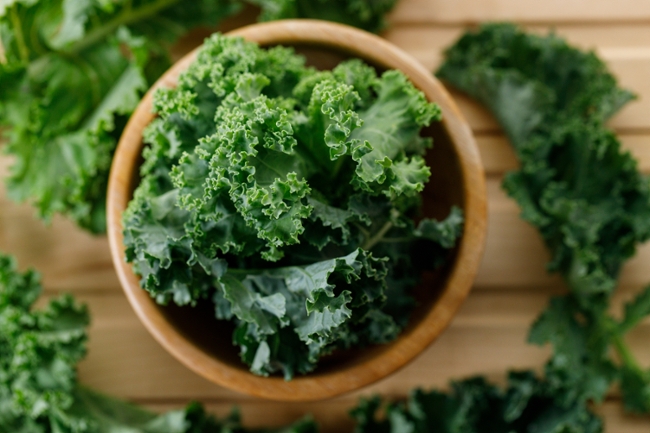| News for food, nutrition and health professionals | SIGN UP ⋅ SHARE |
|
|
 
|
Healthy Start
 |
| (Janecocoa/Getty Images) |
Kale offers numerous health benefits, including reducing the risk of Type 2 diabetes, heart disease and certain cancers, according to registered dietitian Barbie Cervoni. The leafy green provides antioxidants, fiber, and essential nutrients like vitamin K and calcium, which support heart, bone, and gut health. However, individuals on blood-thinning medications or with thyroid conditions should monitor their kale intake due to its vitamin K and goitrogen content.
|
|
 |
| "Kale delivers a wide range of essential nutrients, raw or cooked. Its impressive vitamin and mineral profile make it a versatile and valuable part of your diet." -- Barbie Cervoni, RD |
|
 |
|
|
 | AI is the Future of Commerce. Stay Ahead.
AI isn't hype anymore—it's here. Join EPAM, Stripe, and commercetools to learn how to harness AI—responsibly and effectively. See how AI is reshaping the shopper journey, and learn why composability is key to doing it right. The brands moving first are already winning. Register now! |
|---|
| |
|
|
 
|
Dietary Health
The British Dietetic Association has released new evidence-based dietary guidelines for managing chronic constipation, highlighting kiwis, rye bread and specific supplements as effective remedies. Lead author Eirini Dimidi emphasizes the guidelines' focus on diet over pharmaceuticals, aiming to empower patients and improve quality of life. "I see chronic constipation across the spectrum," said Sue-Ellen Anderson-Haynes, a registered dietitian and spokesperson for the Academy of Nutrition and Dietetics. "I see it in toddlers, I see it in school-age children, I see it in adults. So it's a common thing," she said. |
|
|
There is widespread consumption of added sugars in the American diet, adding to health risks associated with excessive intake, such as heart disease, metabolic syndrome and Type 2 diabetes. Registered dietitian nutritionist Katie Chapmon and RD Grace Derocha, a spokesperson for the Academy of Nutrition and Dietetics, provide insights into distinguishing between natural and added sugars and offer practical tips for reducing sugar consumption, such as starting small and focusing on protein and fiber. Derocha also discusses the role of artificial sweeteners and emphasizes the importance of moderation and a balanced diet.
|
|
|
 | The Future of Retail: What's Coming in 2026
AI personalization and seamless customer experiences defined 2025, but the retail landscape is about to shift again. Join us on November 5th for a fast-paced webinar where industry experts reveal the top trends and technologies shaping 2026. Discover how to stay ahead, boost productivity, and deliver next-level shopping experiences. Register now! |
|---|
| |
|
|
 
|
Leadership & Best Practices
 |
| (LadadikArt/Getty Images) |
As AI continues to usurp the intelligence and optimization roles, the business leader must become a gardener who nurtures adaptable, sustainable ecosystems, writes Mark Beliczky, a CEO, board member and leadership advisor. Beliczky explains that a gardener-leader uses the wisdom and context that AI lacks to balance structure with flexibility, prune when necessary and build resilience for long-term value.
|
|
 |
|
By "cultivating trust, curiosity, and renewal across the human ecosystem," the leader "will not be a master of information, but a gardener of wisdom," Mark Beliczky says.
|
 |
|
|
|
Science & Research
| |
 |
| (Pixabay) |
A study published in the Journal of the American Medical Association found an AI-based diabetes prevention program was as effective as a human-led virtual program in helping adults with prediabetes maintain an A1C of less than 6.5%. The app program had higher completion rates and was seen as potentially more accessible for people with busy schedules. The program: Study volunteers received a Bluetooth-enabled scale along with instructions for downloading an app that delivered push notifications. After one year, almost 32% of participants in both the AI-based and human-led study arms achieved the primary outcome, a composite of A1C, weight and physical activity measures. |
|
People exposed to sugar rationing in utero and during their first two years of life had lower risks of cardiovascular disease and related conditions after age 40, according to an analysis of data from the World War 2 era when sugar rationing was common. The study, published in The BMJ, compared people who experienced sugar rationing with those who had not and suggested diabetes and hypertension may account for 31% of the link between sugar rationing and cardiovascular disease, with birth weight linked to 2.2%. |
|
|
|
Prevention & Well-Being
|
Daylight saving time ends Sunday in most of the US, and health experts suggest exposure to morning sunlight to help reset the body's circadian rhythm. "More light in the morning and less at night is key to keeping that rhythm on schedule -- all the instruments in sync," said Jamie Zeitzer, co-director of Stanford's Center for Sleep and Circadian Sciences.
|
|
|
The Agriculture Department has indicated it will not use $6 billion from the Supplemental Nutrition Assistance Program contingency fund to cover benefits if the government shutdown continues into November. This decision could leave more than 40 million people without food assistance, as the contingency fund is short of the $8 billion necessary to cover next month's benefits.
|
|
|
|
Foodservice Management
Seventy-three percent of US consumers believe they should eat more whole grains, primarily for health reasons, according to a Whole Grains Council survey. Nearly half have increased their intake over the past five years. Taste and cost are both motivators and barriers, with 43% citing taste as a benefit and 44% viewing cost as a barrier. |
|
|
Gen Z and millennials are leading a shift toward conscious consumption, prioritizing protein, fiber and gut health while seeking clean labels and bold global flavors, according to Spins data. Nearly 90% of these consumers actively avoid certain ingredients, particularly sugar and artificial sweeteners.
|
|
|
| | |
